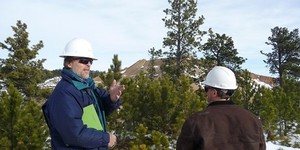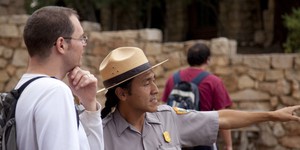Log In
Summary
*Note:
For this science project you will need to develop your own experimental procedure. Use the information in the summary tab as a starting place. If you would like to discuss your ideas or need help troubleshooting, use the Ask An Expert forum. Our Experts won't do the work for you, but they will make suggestions and offer guidance if you come to them with specific questions.
If you want a Project Idea with full instructions, please pick one without an asterisk (*) at the end of the title.
If you want a Project Idea with full instructions, please pick one without an asterisk (*) at the end of the title.
Abstract
Is there a public park, playground, or beach near you that suffers from a litter problem? Here is a way that you can do something about it! First, get a measure of the size of the problem by conducting a litter survey. Select a fraction of the area to survey at regular intervals (e.g., every two or three days, or maybe once a week). The area should be large enough so that you can get a representative sample of litter, but not so large that you can't clean it up. Each time you conduct your survey, collect all of the litter within your sample area. Count or weigh each type of litter, and keep track of your results in your lab notebook. Which is the most common type of litter? Have your parents, your teacher, and local community groups help to publicize your results. For example, you could post signs on the trash containers listing how much litter the park gets per week, reminding people to clean up after themselves. See if your local Parks Department can help. Maybe they can organize a cleanup day with help from your community. Does the park stay cleaner after your efforts? (Idea from Cannon, 2005)Bibliography
Cannon, K.B., 2005. "What Is the Most Commonly Found Litter on the Beach?" California State Science Fair Abstract [accessed June 20, 2006] http://cssf.usc.edu/History/2005/Projects/S0802.pdf.Ask an Expert
Do you have specific questions about your science project? Our team of volunteer scientists can help. Our Experts won't do the work for you, but they will make suggestions, offer guidance, and help you troubleshoot.
Global Connections
The United Nations Sustainable Development Goals (UNSDGs) are a blueprint to achieve a better and more sustainable future for all.
This project explores topics key to Responsible Consumption and Production: Ensure sustainable consumption and production patterns.
This project explores topics key to Life on Land: Sustainably manage forests, combat desertification, halt and reverse land degradation, halt biodiversity loss.
Careers
If you like this project, you might enjoy exploring these related careers:
Career Profile
Have you ever noticed that for people with asthma it can sometimes be especially hard to breathe in the middle of a busy city? One reason for this is the exhaust from vehicles. Cars, buses, and motorcycles add pollution to our air, which affects our health. But can pollution impact more than our health? Cutting down trees, or deforestation, can contribute to erosion, which carries off valuable topsoil. But can erosion alter more than the condition of the soil? How does an oil spill harm fish…
Read more
Career Profile
Are you passionate about the environment? Do you like developing and implementing new ideas? Do you enjoy talking with people about how humans impact nature? If these things are true about you, then you may be the ideal candidate for a job as a sustainability specialist. Sustainability specialists work in large and small corporations and universities to design and execute energy and resource conservation programs that reduce their employers' impact on the environment. This is a great career for…
Read more
Career Profile
Park rangers are the law enforcement officials of our state and national parks. They protect and preserve parklands, keeping park resources safe from people who might try to damage them, deliberately or through neglect, and keeping people safe from dangers within the park. To achieve this goal, park rangers work in a wide variety of positions, including education and interpretation for park visitors, emergency dispatch, firefighting, maintenance, law enforcement, search and rescue, and…
Read more
Career Profile
Any time there is more than one person in a room, there is potential for a social interaction to occur or for a group to form. Sociologists study these interactions—how and why groups and societies form, and how outside events like health issues, technology, and crime affect both the societies and the individuals. If you already like to think about how people interact as individuals and in groups, then you're thinking like a sociologist!
Read more
Related Links
- Science Fair Project Guide
- Other Ideas Like This
- Environmental Engineering Project Ideas
- My Favorites
Cite This Page
General citation information is provided here. Be sure to check the formatting, including capitalization, for the method you are using and update your citation, as needed.MLA Style
Science Buddies Staff.
"Fighting Litter in Your Neighborhood." Science Buddies,
20 Nov. 2020,
https://www.sciencebuddies.org/science-fair-projects/project-ideas/EnvEng_p020/environmental-engineering/fighting-litter-in-your-neighborhood?class=AQXTdEbHR7IivaLCF4koOPR5zEYY9rfzr4gA7urs_CfA_VGDaSrM7kiTFHO82Rocq2zs2N3F19QHeI5VufafgZVucjU7vPIhGIivqmPk3hSciA.
Accessed 25 Apr. 2024.
APA Style
Science Buddies Staff.
(2020, November 20).
Fighting Litter in Your Neighborhood.
Retrieved from
https://www.sciencebuddies.org/science-fair-projects/project-ideas/EnvEng_p020/environmental-engineering/fighting-litter-in-your-neighborhood?class=AQXTdEbHR7IivaLCF4koOPR5zEYY9rfzr4gA7urs_CfA_VGDaSrM7kiTFHO82Rocq2zs2N3F19QHeI5VufafgZVucjU7vPIhGIivqmPk3hSciA
Last edit date: 2020-11-20
Explore Our Science Videos
Make a Paper Lantern STEM Activity
Make a Thermometer - STEM Activity
How Do Viruses React To Soap?












